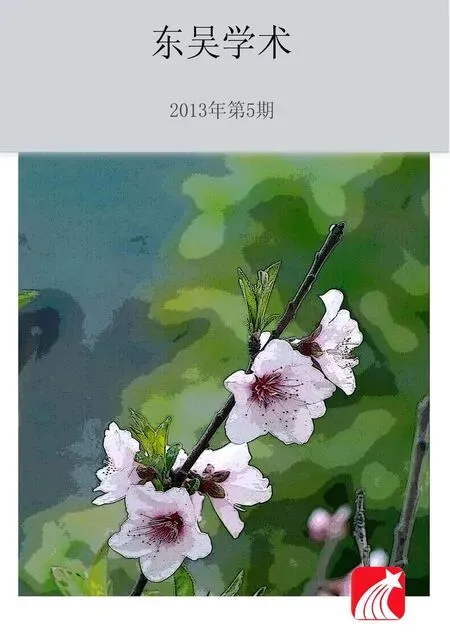《双典批判》英文版译者序①
2013-03-26舒允中
舒允中
面对中国在西方列强手中遭受的凌辱梁启超等晚清改革家开始注意到通俗小说对民众的影响并开始将通俗小说看成改革工具。五四时代的作家随后也意识到小说的广泛影响并企图将小说转变成针砭社会的有效手段。然而晚清时代和五四时代的作家和批评家们却没有潜心研究中国传统小说中的文化内涵。一九四九年以后文学批评受到政治环境左右,自然没有什么人去探讨传统小说的文化内涵。即使在改革时期文化界关心的也只是如何利用传统小说制造迎合市场口味的文化产品,如电视剧等,而不是如何解析传统小说。这种长期以来对传统小说文化内涵的忽视正是刘再复在《双典批判》中力图加以纠正的现象。
《双典批判》不是一部通常意义上的文学批评著作而是一部文化批评著作。在指出暴力崇拜和权术崇拜分别为《水浒传》和《三国演义》的核心思想的同时刘再复探讨了中国文化的一些阴暗面,因此他的批判对象可说是中国文化。在《双典批判》中刘再复讨论了这两部小说的文化内涵的具体历史成因,但他最感兴趣的是这些文化内涵与中华民族国民性的联系。同时他也将这两部小说与《山海经》和《红楼梦》之类的传统作品进行比较并借此提醒读者注意中国文化的多面性。在当代中国的文化语境中 《双典批判》发扬光大了五四的批判精神。
在《双典批判》中刘再复不仅讨论了《水浒传》和《三国演义》的文化内涵而且也讨论了金圣叹和李贽等历代批评家对这两部作品的诠释以及这两部作品在中国社会的流行。在《双典批判》中我们可以发现鲁迅等中国作家和批评家的影响,也可以发现一些西方观点,如史宾格勒的“伪形”观点的影响。《双典批判》不断进行中西文化观念的比较,因此这部著作实际上也是对现代性和现代化这两个重大命题的探讨。本书的对象原为中文读者,这个英文译本将使英文读者了解一位重要的当代中国评论家考虑的种种问题。
As China suffered repeated military defeats at the hands of foreign powers in the second half of the nineteenth century,late Qing reformers such as Liang Qichao began to call attention to the importance of popular fiction as a medium through which ordinary Chinese could be roused to save their country.Following in Liang’s footsteps,May Fourth writers of the 1920s and 1930s continued to promote vernacular fiction as the most effective literary genre for the exposure of the ills in Chinese society.However,in spite of the general recognition of the reach of popular fiction in society,few Chinese critics paid sustained attention to the cultural values deeply embedded in traditional Chinese fiction.After 1949 this oversight became more serious as political considerations swayed the evaluation of traditional fiction,as can be seen,most typically,in Mao Zedong’s criticism of The Water Margin in 1975.The inattention to the cultural values in traditional Chinese fiction continued in the reform era of the 1980s and 1990s,when,for example,filmmakers adapted episodes from traditional novels into widely popular television series without subjecting the original works to critical examination.This persistent error is what Liu Zaifu tried to correct with A Study of Two Classics.
A Study of Two Classics is not a work of literary criticism in the conventional sense.Instead,it is a critique of cultural standards and ideals in The Water Margin and The Romance of the Three Kingdoms,two of the most popular traditional Chinese novels.In summing up the worship of violence as the ideal in the former and the worship of trickery as the ideal in the latter,Liu Zaifu examined certain harmful aspects of Chinese culture.As a result,his critique became,in effect,a critique of Chinese culture.While holding up the two classics as windows into certain aspects of Chinese culture,Liu focused his attention not so much on their specific historical origins as on their enduring popularity and social impact,linking them to the Chinese national character.Aware of the multiple facets of Chinese culture,he also explored the sharp contrast in cultural values between the two novels and other Chinese cultural classics,such as The Classic of Mountains and Seas and The Dream of the Red Chamber.As he called the two classics into question,he continued the critical spirit of the May Fourth Movement in contemporary China while expanding the scope of its cultural examination.
In A Study of Two Classics,Liu Zaifu explores not just the contents of the two classics but also the interpretations of the two novels by traditional commentators,such as Jin Shengtan and Li Zhi,and the reception of the two novels in Chinese society.He drew inspiration from May Fourth intellectuals,particularly Lu Xun,and from a wide range of works by Western scholars.For example,he used Oswald Spengler’s notion of pseudomorphosis to explain the degeneration and falsification of certain values in Chinese culture.In terms of his references to both Chinese and Western authors,one should also note that,in his reflections,Liu remained concerned with the issues of modernity and modernization as he frequently compares Chinese cultural values with Western cultural values either implicitly or explicitly.Originally intended for a Chinese audience,his book can help English-speaking readers understand the issues a leading contemporary Chinese critic tried to address.
